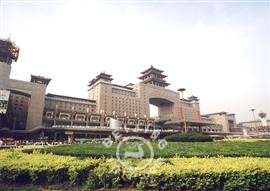
Beijing, the pivot of the national rail network, is easily accessible by train from all directions of the country. There are five large railway stations in Beijing, Beijing Railway Station, Beijing West Railway Station, Beijing East Railway Station, Beijing South Railway Station, and Beijing North Railway Station. Among them, the first two are larger passenger stations of domestic and transnational trains. These five stations have tracks running to most provincial capitals and major cities in mainland China as well as Hainan and Taiwan provinces. More information on Introduction of Beijing Railway Stations.
In China, traveling by train is rather cheap and safe, especially when your trip is long. Due to the broad territory of the country, the trains take more time of course, to cover the vast distances than do planes. It is best to ask for the timetable of your desired train before starting your journey. Long-distance trains and overnight trains are equipped with a dining car, meal less opulent and price higher than that in restaurants. Carts providing drinks, fruits, snacks, and other items for sale are pushed along the aisle, price also a little higher. The toilets will not be as clean as you would expect, and they can't be used at stations. Sometimes, there are sales persons selling small products like socks, keepsakes and toys, and they often give a lively introduction about their articles.
Train Types
In China, the passenger trains are always designated into different classes according to the speed, and these different classes of trains have varied train numbers. If a train has an odd number, it means the train will travel in the opposite direction of the capital; otherwise, an even-numbered train will travel towards the direction of Beijing. Besides, the train number is always prefixed with a Chinese Pinyin (Chinese phonetic alphabet) written in upper case to show the speed of the trains. For fast trains, they always arrive on time and are seldom delayed, except when there are inevitable and unforeseen factors. Ordinary trains and temporary trains are more likely to be behind schedule than others. When an ordinary or temporary train receives a stop signal, it will stop to make way for a fast train.
 The chart below is used as an example:
The chart below is used as an example:
|
Prefix Characters
|
Meaning
|
Explanations
|
|
D
|
Bullet Train, Electric Multiple Units (CRH) Train
|
Fastest
|
|
Z
|
Direct Train
|
Faster, few or no midway stops
|
|
T
|
Express Train
|
Faster, only stop in major stations
|
|
K
|
Fast Train
|
Faster
|
|
N
|
Trains running within a certain region
|
Fast
|
|
No character
|
Accommodation Train
|
Stops at every stations |
|
Y
|
Temporary tourist trains
|
-
|
|
A or L
|
Temporary trains
|
-
|
Seat Classes
There are four standard classes of seats available, namely, the soft sleeper, hard sleeper, soft seat and hard seat. The price of the seat will vary from the soft sleeper which is the most expensive to the harder seat, which is the cheapest. In the train, you can change your seat class to a higher class or to a lower class. The difference of the ticket cost will be charged or refunded according to the seat classes, and a service fee will be charged at the same time.Soft sleeper: There is a 2-bed sleeper as well as a 4-bed sleeper in a soft sleeper berth, but the latter is more common. On each side of a 4-bed sleeper berth, there are two sleepers, an upper one and a lower one, and the price for an upper sleeper is cheaper. Hard sleeper: On both side of a hard sleeper berth, there are three sleepers, a lower one, a middle one and an upper one. The price for an upper sleeper is the cheapest among these berths. Soft seat: The soft seat carriage is more comfortable and less crowded than the hard seat carriage. Hard seat: Owing to its lower price, the carriage is often crowded and not as clean and comfortable as the other carriages. Besides, during the Chinese legal holiday, the summer vacation, and the Spring Festival, the ticket for a hard seat is always difficult to buy, and there are many people who hold standing-room tickets in the carriage.
How to Buy Train Tickets
All train tickets can be booked at most 10 days in advance. Besides, people can buy long-distance train tickets for other large stations within 12 days in Beijing. If you buy tickets at the ticket offices instead of railway stations, you will be charged CNY 5 for each ticket as a service fee. Purchasing tickets on your own would be confusing and time consuming. You are advised to book your tickets via travel agents at hotels, though they will charge more, because of service fees. Beijing West Railway Station and Beijing Railway Station have special counters to serve foreigners and guests from Hong Kong, Taiwan and Macao. Passports or other certificates are required.In Beijing, there are many outlets selling train tickets, therefore, the selling of tickets runs out within a short time. It is best to buy a ticket as early as possible. The ticket offices are always marked by the Chinese characters '售票处' in a very effective color scheme. Ticket scalpers are more active during the Chinese legal holidays, summer vacation and the Spring Festival. You would better off to buy tickets at the ticket windows or ticket offices to ensure that you have a legitimate and legal ticket for your journey.
 Station Hot Line Service
Station Hot Line Service Beijing Railway Station
Passenger Inquiring: 010-51019999
Tickets booking: 010-95155105, 010-51834512
Beijing West Railway Station
Passenger Inquiring: 010-51826253, 010-51826263, 010-51826273
Tickets booking: 010-51824233, 010-51824261